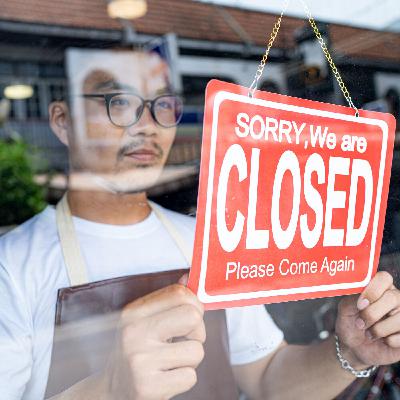The Crisis of Normalizing Abnormal
Description
Are you OK with people pissing and crapping on the streets of your city? Are you OK with fatherless homes becoming the norm? It’s time to stop normalizing the abnormal.
Thanks for reading pushbacknation! Subscribe for free to receive new posts and support our work.
Transcript
Will Loconto:
I'm Will Loconto, I'm here with my partner Cindy Bass. Today we're asking some simple questions: first, are you okay with people pissing and crapping on the streets of your city?
Cindy Bass:
Well, that would be a hell no. Because we have a crisis on our hands. A crisis of normalizing the abnormal,
Will:
The bare minimum responsibility of city government is to provide safe streets for taxpayers, businesses, and property owners. Allowing and enabling people to live on our streets is inhumane. And we need to hold our city leaders accountable.
Cindy:
Well, we pay taxes. The money has to go somewhere and they have responsibilities to keep our roads maintained. Part of this is to keep the city safe and clean. Yes. That's just a standard.
Will:
Well, and it should be the priority. It should be, the priority shouldn't be how to address a homeless issue. The priority should be keeping the streets safe for regular people, families, taxpayers, property owners, and the businesses that are in these neighborhoods.
Cindy:
It also is the drug use. When we were young, we'd go to clubs and stuff. People are walking around, you're going to different clubs. So that happens in your cities, but this is different. People are just everywhere. You and I went to Vegas. Vegas is like something like outer space when you go on the streets of Vegas and it's really sad. But when you step over someone that is completely, almost unconscious, needs to go to the hospital,
Will:
Half the time you don't know if they're alive.
Cindy:
Right. You don't. Actually, one time when I was with my kids, I stepped over a girl and I can still see her, and I literally wanted to cry because how could she get to that point that she was laying under the stop sign of a busy intersection while everybody was stepping over her like,
Will:
Well, and it's inhumane to leave her there
Cindy:
It is.
Will:
From the city standpoint.
Cindy:
It is. And we are going to talk about, and we always talk about children and how all of this affects children. So when your little ones or your grandkids are with you and you're walking by things like that, like a grown man, taking a crap on the city street and you have a child with you, they see it.
Will:
Right? And if everything smells like weed and piss the kids notice that.
Cindy:
They do.
Will:
And they probably don't even know what to think.
Cindy:
Yes. But what we're talking about is by them seeing it over and over, and as a parent or a grandparent taking them beside it and walking past it, you are conditioning them and you are normalizing this. You are making it okay.
Will:
And the fact that they leave people on the streets, fentanyl, totally unconscious, bent over whatever, crapping in the street, taking a piss, the fact that cities are literally lessening the penalty for public urination and public defecation, that to me sounds like we've given up. It's ridiculous. And the answer for some of that is not to be more lenient and it's not working. I mean, you go see tent cities
Cindy:
It's the demise of the city. And so we're seeing this here in Austin with the homeless, the encampments. They're destroying properties. They are polluting streams and waterways. The waters of the United States are getting pollution from these encampments, trash everywhere, disease, sickness. Honestly, it's just cruel to let it happen.
Will:
Well, and they don't have to make it illegal to be homeless, but they need to make it illegal to be doing drugs openly on the street. They need to be making it illegal to camp on the street, to put up a tent, but
Cindy:
They're camping on someone's property.
Will:
Well, a lot of the time it's public city property, but the city shouldn't be allowing that.
Cindy:
The city should push 'em out to the edge. And then when they get on private property, they should be removed from it and they need to go into some sort of shelters.
Will:
The answer for this problem is mandatory shelter for homeless people.
Cindy:
Mm-hmm.
Will:
Forced. If it needs to be forced.
Cindy:
Right.
Will:
Because in the interest of protecting the population that is not on drugs or mentally ill, you need mandatory drug treatment, mandatory treatment for mental illness, and mandatory shelter for homeless people. If there's a disciplinary problem at the shelter, then that needs to be against the law.
Cindy:
So someone might ask you Will, how are you going to pay for all that?
Will:
They're already paying for it.
Cindy:
How?
Will:
San Francisco has billions of dollars. Billions of dollars
Cindy:
That they're spending on homeless now?
Will:
On homeless. On the homeless. Yeah. Actually, I just saw a thing that said they spend over $87,000 a year per homeless person in San Francisco, and their solution is to have open air, safe use drug sites and act like that's saving a drug users life by giving them a safe place to use it. They act like that that's some humane thing. Enabling it is not humane. And the numbers do not play out that when they come to these sites that most or even a minimal number of them go to treatment. It's not even close to that.
Cindy:
I remember seeing in recent years, bathrooms at different places that I shopped had needle containers for drug addicts.
Will:
Right. And can you imagine being a business, your family business is somewhere where a homeless guy comes in to wash himself in the bathroom of your little restaurant or something that's not
Cindy:
Well, it's the reason why I can't go to the restroom at a lot of places. Recently, we were at a bridal shop and we were not allowed to use their restroom. They said they didn't have one, which is BS. They have one because they're using one. But they would not allow us to. And I find this is the reason.
Will:
Well, they had that whole thing with Starbucks about letting homeless people use their restrooms or not. And what the recipe for that ends up being, that the result consequence of that is probably that the restrooms are destroyed.
Cindy:
But by normalizing this behavior, that consequence to someone like me is I don't get to use a restroom because of street people that come in that damage restrooms and do things they're not supposed to in there. Therefore, I can't take my child or my grandchild or myself into a restroom because they're not going to allow you to use it. Which I don't blame them right now. I really don't. Because it would be scary to let people come off the street and use it because you can't deny someone unless it's a customer.
Will:
Well, some of them will say customer use only. You have to be a customer to use this restroom.
Cindy:
Well, I could say I was a customer. Define customer.
Will:
Well, I think that gives,
Cindy:
Say I had to buy something,
Will:
Well, right.
Cindy:
To be a customer?
Will:
But I think that that ends up at least just giving the business the right to tell somebody no.
Cindy:
Another one that really bothers me is the drag show thing. Just thinking about this the other day, again,
Will:
Normalizing, you mean?
Cindy:
Normalizing.
Will:
Normalizing something that is a fringe adult activity,
Cindy:
Which has been going on forever. And drag shows actually are so funny. They're comedians. They have an extraordinary talent to do makeup and become a character and entertain adults.
Will:
Well, what's interesting is comparing a drag show now today with, so back when I was touring with the band, and we would play sometimes in gay bars that would have drag shows. So I've been to several back then. Drag shows usually were people dressing up as Marilyn Monroe or Diana Ross and performing lip sync to something like that. There weren't men dressed as women wearing thongs rolling around on a stage showing you their private parts.
Cindy:
And they're not in the public library.
Will:
Oh, no, no. This was in specifically in
Cindy:
Oh, I know. But I mean now club. That's what I'm saying.
Will:
Now they want it to be out in the public for
Cindy:
And then can you imagine having a child that goes to school or goes to a library and sees this person? The child mig























